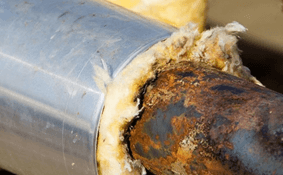
Pre-insulated pipe systems have many advantages compared to the rock wool / glass wool and sheeting insulation production carried out in the field, which is called the classical system insulation.
|
CLASSICAL SYSTEM |
PRE-INSULATED SYSTEM |
|
|
Heat Loss |
The thermal conductivity value of rock wool insulation varies between 0.04 and 0.12 W/mK. |
The thermal conductivity value of polyurethane insulation is 0.029 W/mK in maximum. |
|
Cost |
In addition to providing a suitable basis for the application of the classical system, it brings many additional costs.In addition to reinforced concrete duct manufacturing or steel support manufacturing, the employment of the insulation team required to work in addition to the pipe installation team also increases the labour costs.The completion time of all these productions results in additional costs |
Pre-insulated systems can be buried directly under the ground, and they are the systems that do not require additional labour, and from which an insulated line can be obtained during pipe installation.The short duration of the work, the absence of additional staff, equipment and construction costs render this system more advantageous in terms of cost. |
|
Energy Efficiency |
The high value of heat loss increases energy and fuel costs. |
It is a more economical and more environment friendly system due to keeping fuel costs low during operation. |
|
Service Life |
In classical insulation, partial sheet metal coating is made, and it is inevitable for this coating to absorb moisture and open up over time. |
Pre-insulated pipe systems have a service life of at least 50 years under continuous operation up to 115 °C. |
|
Labour Period |
The entire insulation process is performed on the site. An additional insulation team has to work in addition to the pipe installation staff. The insulation team performs sheet metal cutting, rock wool cutting and wrapping and sheet coating in the field, and such manufacturing may take longer than pipe installation. |
In pre-insulated systems, since the pipes and all fittings are brought to the site as already insulated, no additional labour is required for welding and installation. The joint insulation kits dispatched with the products and the insulation process of the welding spots can be performed at a speed that can be measured in seconds and they do not require any expertise. |
| Reinforced Concrete Duct and Steel Constructions |
In pipelines with classical system insulation, steel support manufacturing and sliding and fixed support manufacturing are needed, which must be placed at certain distances if the pipes are inside a reinforced concrete duct or above the ground.The construction, on the other hand, results in additional construction and material costs. |
Pre-insulated systems can be buried directly in the ground and they are the systems that do not require additional manufacturing such as reinforced concrete duct, support, sliding or fixed support. |
| Corrosion | In classical system insulation, insulation is created by combining parts.Due to the gaps that may occur in between and the humidity sensitiveness of the system, the system cannot protect the carrier pipe from impacts such as corrosion, etc. The service life of the carrier pipe gets shortened and the repair costs during operation increase | Pre-insulated pipe systems are created by combining the extruded HDPE casing pipe and Polyurethane insulation with the main carrier pipe without a gap.In this way, it has high resistance against external factors such as humidity and the system protects the main carrier pipes against corrosion for many years. |
| Standard | There is no manufacturing standard. | Manufacturing is carried out in accordance with the standard EN 253. |
| Fittings | Fittings insulation workmanship requires more care and increases the possibility of occurrence of fault. | All fittings parts are manufactured as pre-insulated in accordance with the standard EN 448 |
| Rigid and Homogeneous Distribution |
In classical system, since the rock wool is wrapped manually and partially, it is not possible for the insulation thickness to be the same throughout the entire pipeline. In addition, due to its structure, rock wool is a soft material and it has a weak resistance against external impacts.On the other hand, since galvanised sheet coating is made of thin sheet metal and cannot fully provide the sealing of the gaps, it cannot function to protect the insulation. |
Since it is plastic-based and seamless, the HDPE casing can protect the insulation against external factors for many years.On the other hand, rigid polyurethane insulation is extremely durable against impacts together with the HDPE casing pipe.In insulation made with the injection method, there is no axis deviation and the insulation thickness remains constant throughout the entire line. |
| Expansion and Stress Control | In pipelines in free condition, the expansion and stress values are much higher, the compensator, fixed support and omega applications are of great importance for the solution of this issue | In pre-insulated pipe systems buried directly under the ground, the friction force of the earth has a limiting effect on stress and expansion, and installation can be done without the requirement for any extra precautions. |
| Leakage | There is no standard leak detection system | Pre-insulated systems that are installed in the field in accordance with the standard EN 13941 have a leakage detection system in accordance with the standard EN 14419. |


